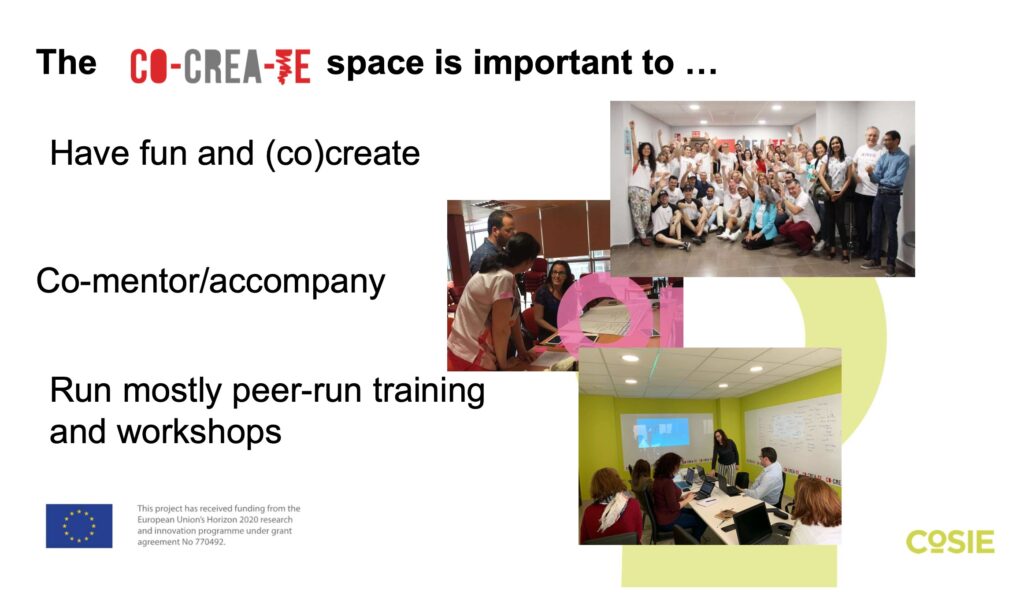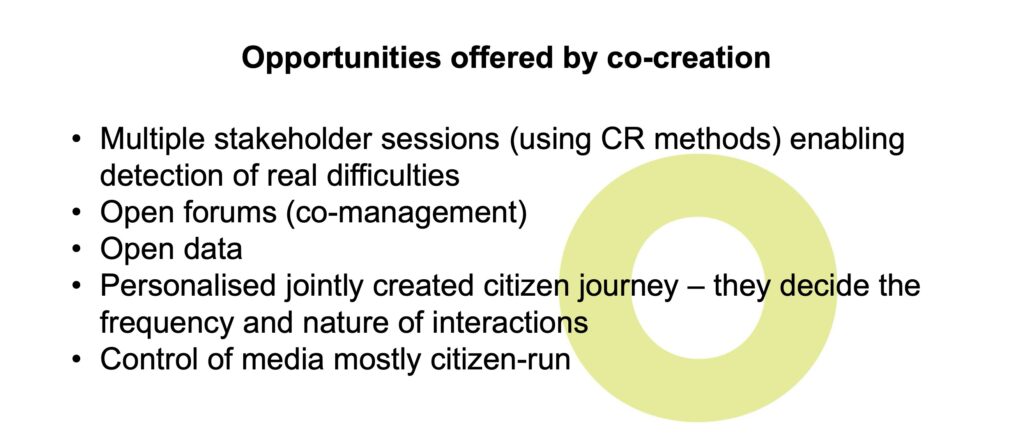Methods and tools used in the Spanish pilot

The use of open data, Social media and Digital technologies
- Control of social media is almost entirely generated and run by users, mentors act on the same hierarchical levels.
- Data from social media are used to identify new groups to target for collaboration.
- Open data is used to generate new business ideas.
The role of open data: Exploring new opportunities.
The data usability is high on the agenda also in València, where the OpenValència App was initiated based on the findings that the data is not necessarily organized on the city hall’s transparency portal in a way that is useful and needs to be aggregated or shown in other formats. The app seeks to reduce the time needed to find the information available and then link to a platform where citizens can express their need for any new data.
Exploiting various open data sources. One of the open data source used at Co-Crea-Te to date has been the Open Data Transparency Portal provided by Valencia City hall, also described as the good governance portal. The open data portal provides information on topics such as the environment, society and welfare, health or tourism.
Transforming the data into business ideas. The transparency portal of the city hall was used as a basis for creating new business opportunities based on the information available on the site. It was hoped that the ideas generated will form the basis of some form of collaborative future activity. During an open day organized at Co-Crea-Te just before the August 2019 break users and staff invited people from the local community and other stakeholders to join them in events such as a pitching competition (which was sponsored with a small amount of prize money by a local bank) and a series of team building activities.
The OpenValència App
In the city of Vallencia the idea was to create a portal that serves the needs of businesses and citizens and is also co-created by them.
The OpenValència App was inspired by the idea that data is the currency of the future and it was seen as public authorities’ responsibility to put that currency in the hands of the citizens of València to facilitate the access they need. The users of Open Data Application Initiative (ODAI) come in two main categories: i) business looking to provide services to clients and provide, for example, real-time information about urbanization, transport and municipal facilities, and ii) citizens, who may not want to use the data in a commercial way but to enhance the lives of citizens by providing information about, for example, access to social housing, or services provided by the city hall to the homeless. In both cases, OpenValència will work with citizens and businesses to lobby city hall to open the information needed to bring about change in the accessibility of data.
The OpenValència App is both a means of finding information quickly and efficiently and a platform for lobbying city hall to open up more data that would enable citizens to harness the valuable information at their disposal. The ODAI was inspired with intriguing questions such as: Have you ever thought of providing a real-time service for allergy sufferers to avoid routes where the highest pollen counts are? Or would you like to see a reduction in the pollution problem that is beginning to plague the city with an app that could help to solve the parking requirements of citizens?
The initiators identified that the usefulness of data is dependent upon its immediacy. For example, in the cases of emergency dental care and traffic data to reduce pollution caused by parking problems data need to be in real-time, or at least almost. Outdated data wastes citizens’ time and causes frustration. The initiators also stress the importance of organizing data on the data portal in a useful and understandable form. It was concluded as unlikely that inhabitants will want to co-create a smarter València and make use of services if they are outdated and useless.
Yet, many citizens are unaware of the transparency portal, how it can be used and how it might be improved through a co-creation process. Developers were confident that citizens will contribute, not only to improving the accessibility of data, but to the data itself. It was also proposed that once new businesses are created using open data, at least some of that data that is either opened or newly created will feed back into the city hall’s portal.
